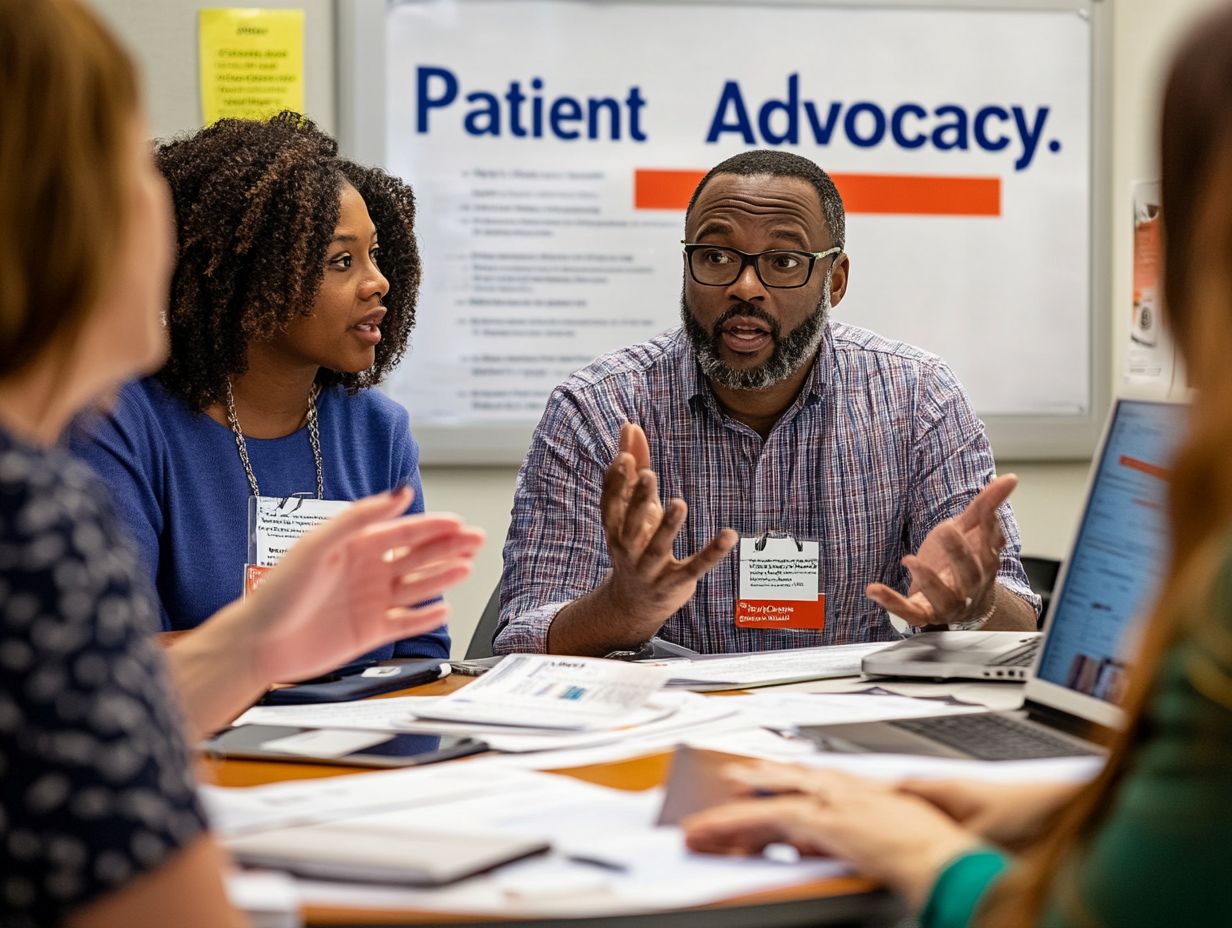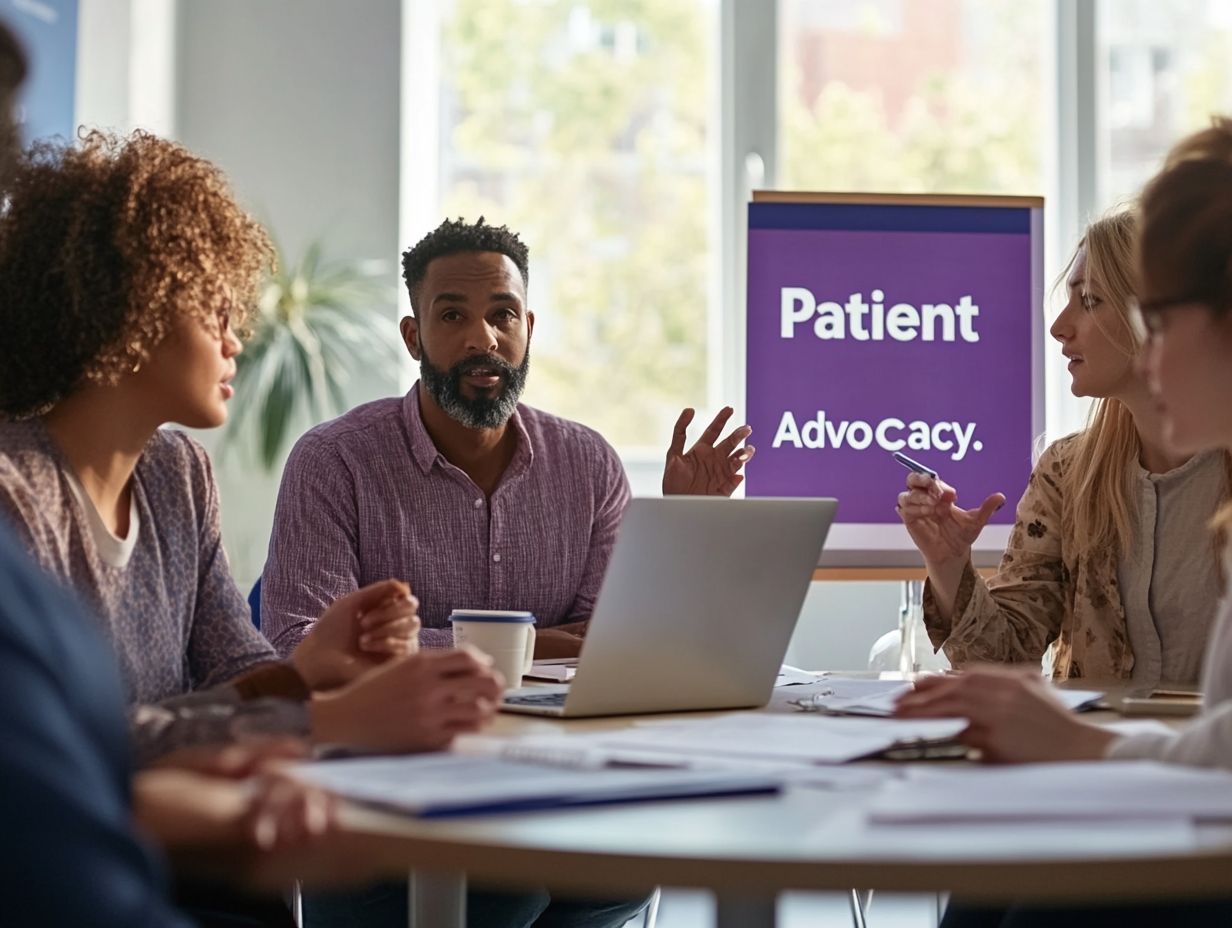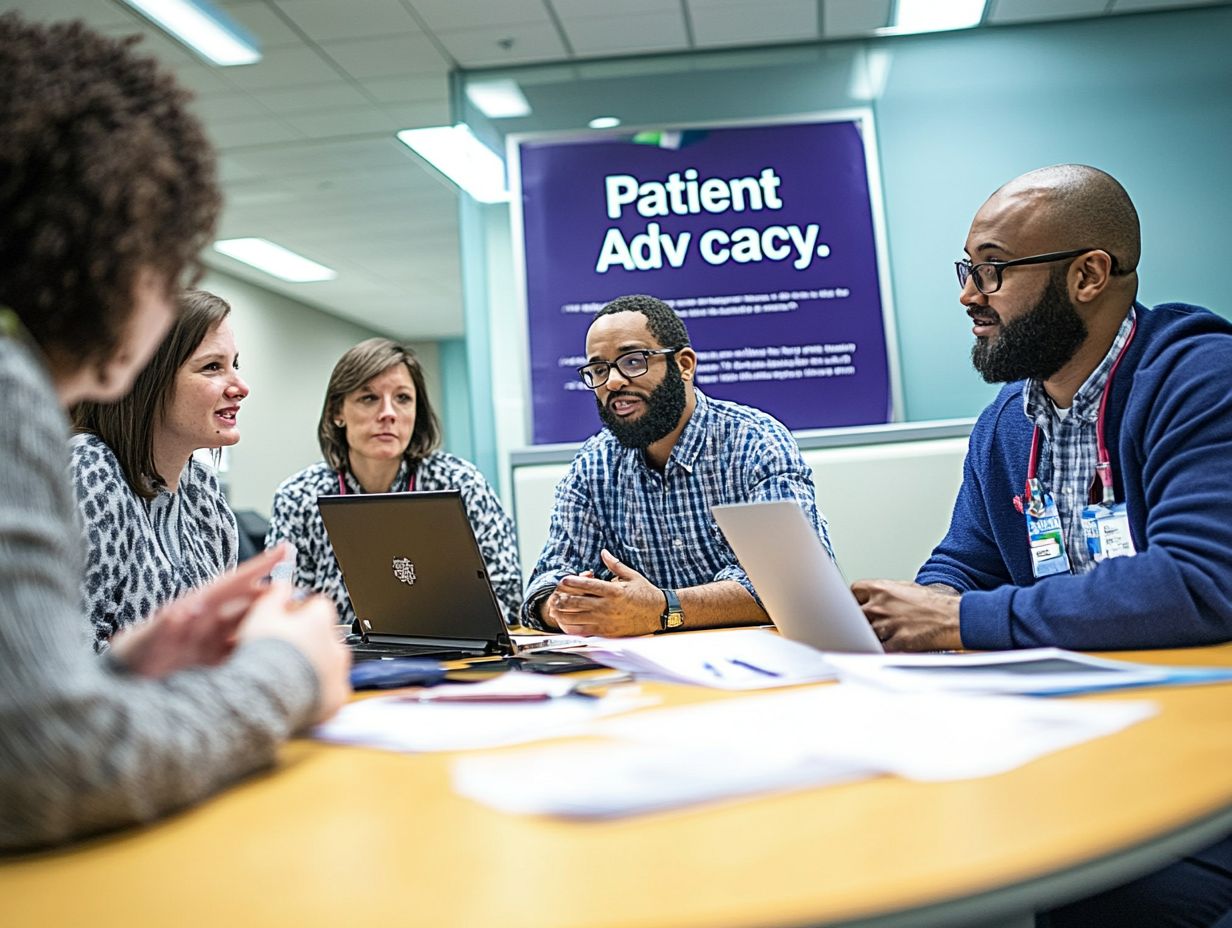Patient advocacy plays a vital role in empowering individuals within the healthcare system by ensuring their rights and needs are prioritized. Several resources are available to support patient advocacy, each offering unique benefits to enhance patients’ healthcare experiences and patient safety:
- Patient Advocacy Organizations: These organizations provide education, resources, and policy influence, helping patients navigate complex healthcare systems.
- Support Groups: Offering emotional support and shared experiences, support groups cater to specific conditions like cancer and diabetes, fostering community and coping mechanisms.
- Online Forums and Communities: These platforms facilitate information sharing and patient rights advocacy, enabling individuals to connect and collaborate. Social media can also play a significant role in spreading awareness.
- Professional Patient Advocates: Advocates guide patients through medical decisions and provider communications, ensuring preferences are respected.
- Government Agencies and Resources: Agencies like the Department of Health and Human Services provide essential guidelines and support for patient rights and advocacy.
Understanding these resources is crucial for patients seeking to navigate the healthcare landscape effectively, advocate for better care, and leverage healthcare trends.
Key Takeaways:
1. Patient Advocacy Organizations

Patient advocacy organizations support individuals with chronic diseases by providing health education, resources, and guidance on healthcare navigation.
These organizations help patients understand treatment options, insurance processes, and their healthcare rights.
Patient advocacy groups, like the National Patient Advocate Foundation (NPAF), influence policy changes for equitable healthcare access and engage in legislative lobbying.
2. Support Groups
Support groups provide individuals with chronic diseases a space for sharing experiences, receiving resources, and gaining emotional support.
Support groups include:
- In-person meetings
- Online forums
- Condition-specific groups for diseases like cancer, diabetes, and mental health disorders
Programs like the American Cancer Society’s (ACSH) Reach to Recovery demonstrate how support groups assist in managing diagnoses and fostering community engagement.
Support groups strengthen coping mechanisms and build supportive networks.
3. Online Forums and Communities
Online forums and communities transform patient advocacy by providing platforms for individuals to share health information and advocate for patient rights.
These platforms facilitate communication among patients, allowing them to connect, share experiences, and create knowledge bases for better healthcare decisions.
Online forums enable patients and promote collaboration by utilizing online platforms for effective communication.
4. Professional Patient Advocates
Professional patient advocates assist individuals in navigating the healthcare system, facilitating informed medical decisions, and communicating with healthcare providers. Health advocates also ensure personalized care and patient satisfaction.
Patient advocates help understand treatment options, clarify medical jargon, and ensure patient preferences and concerns are respected during medical scenarios. They also emphasize the importance of effective communication.
Advocates enhance the patient experience and enable individuals throughout their healthcare journey.
5. Government Agencies and Resources

Government agencies provide essential health resources and uphold patient rights in the healthcare system. They also support patient activism and advocacy efforts.
Key agencies include the following:
- Department of Health and Human Services
- Food and Drug Administration
- Centers for Medicare and Medicaid Services
These agencies develop guidelines, offer health information platforms, and maintain hotlines for patient grievances to support patient advocacy.
What Is Patient Advocacy and Why Is It Important?
Patient advocacy is the act of supporting patients’ rights, preferences, and needs within the healthcare system to ensure they receive quality care. Advocacy training can significantly enhance the effectiveness of these efforts.
Patient advocacy is important because it enables patients to make informed decisions, protects them from medical errors, and ensures their voices are heard in treatment discussions. This leads to improved patient empowerment and health outcomes.
How Can Patient Advocacy Organizations Help?
Patient advocacy organizations help patients by providing education, resources, and advocacy to navigate healthcare systems. They also offer advocacy roadmaps to guide patients through healthcare challenges.
These organizations offer health education programs to improve understanding of medical conditions and treatments.
Patient advocacy organizations create roadmaps to guide patients through healthcare challenges, ensuring effective communication with providers.
What Types of Support Groups Are Available for Patients?
Support groups are available for various health conditions, including chronic diseases, mental health disorders, and addiction recovery. Local support and innovative tools can enhance the effectiveness of these groups.
Types of support groups include:
- Condition-specific groups for diabetes
- Cancer
- Autoimmune disorders
- General groups for chronic health challenges
Support groups provide a platform for sharing experiences and strategies, fostering community and personal growth.
How Can Online Forums and Communities Benefit Patients?

Online forums and communities benefit patients by providing platforms for sharing experiences, accessing health information, and receiving emotional support.
These forums enable patients to connect with others facing similar health challenges, fostering a supportive environment.
Patients become more informed about their conditions and rights, improving health outcomes through shared knowledge. This fosters patient satisfaction and better health outcomes.
What Are the Benefits of Hiring a Professional Patient Advocate?
Hiring a professional patient advocate has several benefits, including improved patient experiences, clearer communication with healthcare providers, and assistance with medical decisions.
Professional patient advocates help patients understand complex medical terminology and treatment options, ensuring their preferences are respected. Nursing ethics play a crucial role in this process.
Advocates provide reassurance and objective guidance during critical decisions.
Employing a professional patient advocate reduces stress and enables patients and families with informed insights, leading to better health outcomes.
What Resources Do Government Agencies Provide for Patient Advocacy?
Government agencies provide resources for patient advocacy, including health guidelines, support networks, and legislative information to protect patient rights. Legislative action is a critical component of these efforts.
Agencies such as the U.S. Department of Health and Human Services (HHS) offer tools and services to assist patient advocates in navigating healthcare systems.
Resources focus on patient rights, access to care, and safety standards.
Frequently Asked Questions
What are some examples of support resources for patient advocacy?

1. Patient advocacy groups and organizations: These groups provide information, support, and resources for patients and their families, as well as advocate for patient rights and better healthcare policies. They also engage in legislative lobbying for healthcare system improvements.
2. Government agencies: Federal and state government agencies often have resources and programs for patients, such as helplines, patient education materials, and legal assistance. Agencies like Justice in Aging provide additional support for vulnerable populations.
3. Healthcare providers: Doctors, nurses, and other healthcare professionals can offer support and guidance to patients, as well as connect them with other resources for advocacy. Healthcare professionals are essential in ensuring patient rights and safety.
4. Online support communities: There are many online forums and social media groups dedicated to patient advocacy, allowing patients to connect with others and share their experiences and resources. Platforms like WebMD and NextAvenue are valuable tools for patients seeking information.
5. Legal aid services: Patients facing medical or healthcare-related legal issues can seek assistance from legal aid organizations for free or low-cost legal representation. Organizations like Be MedWise provide critical support in these areas.
How can patient advocacy groups help patients?
Patient advocacy groups offer a wide range of support and resources for patients, including information on medical conditions, treatment options, insurance coverage, and patient rights. They also advocate for policy changes and awareness on health issues that affect patients. Additionally, these groups provide emotional support and a sense of community for patients and their families. Health awareness programs are a significant aspect of their offerings.
Are there government agencies that specifically focus on patient advocacy?
Yes, there are several government agencies at both the federal and state level that have programs and resources for patient advocacy. These agencies include the Centers for Medicare and Medicaid Services (CMS), the Office for Civil Rights (OCR), and state departments of health or consumer protection. The ACA Marketplace also offers resources for patients seeking coverage and advocacy support.
What services can healthcare providers offer for patient advocacy?
Aside from providing medical care, healthcare providers can also assist patients with advocacy by helping them navigate the healthcare system, explaining treatment options, and connecting them with resources for support. They can also advocate for their patients’ rights and needs within the healthcare system. Effective advocacy from healthcare professionals plays a critical role in patient empowerment.
How can online support communities benefit patient advocacy?
Online support communities allow patients to connect with others who may be going through similar experiences, providing a sense of understanding and community. These online platforms also offer a space for patients to share health resources and information related to patient advocacy. This can be a source of emotional support, empowerment, and patient activism for patients managing chronic illness or other health conditions.
Do legal aid services only focus on medical-related legal issues?
No, legal aid services assist with a variety of legal issues, including those related to healthcare and patient advocacy. These services are often available for low-income individuals and can provide free or low-cost legal representation for patients facing medical or healthcare-related legal issues, including concerns about patient rights and patient safety. Additionally, they can support patients in navigating the healthcare system and understanding their medical records. Patient advocates can also play a crucial role in effective advocacy and ensuring quality care.





